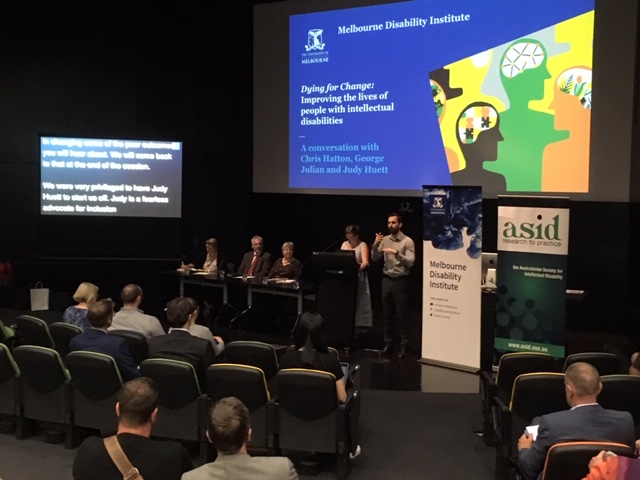Dying for Change - A recent event hosted by MDI
Dying for Change - What will it take to improve the health and lives of Australians with intellectual disability?
Despite the recent spotlight on improving the lives of people with disabilities in Australia with the roll-out of the National Disability Insurance Scheme, people living with an intellectual disability are dying 26 years younger than the general population.
Without support in accessing timely, high quality healthcare, people with intellectual disability face barriers when experiencing a health-related issue and, as a result, are dying prematurely from causes that are preventable.
They are also dying for change.
Improving the health and lives of Australians with intellectual disability was the topic for discussion at the Dying for Change public seminar and roundtable hosted by the Melbourne Disability Institute on Monday 12 November.
At the public seminar held at the University of Melbourne, advocate Judy Huett from Speak Out Tasmania spoke about her own experience living with an intellectual disability and the deaths of her friends, Jack and Andrew, who both passed away aged 58 and 59 respectively. With adequate healthcare, their deaths could have been prevented. Judy ended by asking simply:
How many more Jack’s and Andrew’s need to die too early before action is taken on health care?
Professor Christopher Hatton from the Centre for Disability Research at Lancaster University in the United Kingdom followed by highlighting that living with an intellectual disability is not in and of itself a health problem. An intellectual disability is not a death sentence, yet the sobering research coming out of the UK and Australia indicates that the systematic inequality and barriers people with intellectual disability experience in accessing healthcare is making it one.
As people with intellectual disabilities are more likely to be raised in lower socio-economic families, be bullied or abused, excluded and isolated from the community, be unemployed in adult life and experience poor health care, all of which are likely to lead to ill-health, people with intellectual disability are likely to continue needing help to navigate healthcare systems.
The seminar concluded with Dr George Julian, visiting research fellow from the London School of Economics and an activist, pointing out that the topic being discussed was one of ‘life-and-death’.
‘We really need to hear, expose and elevate the human cost of poor healthcare,’ she said.
Following the seminar, people with intellectual disability, activists, advocates, researchers, policy makers, health practitioners and the like, gathered for a roundtable workshop to discuss ideas on improving the health and lives of people living with intellectual disability.
Those in attendance were asked to consider what change was needed, how change could be achieved and the current opportunities and potential partnerships which could help improve the lives of people with intellectual disability.
